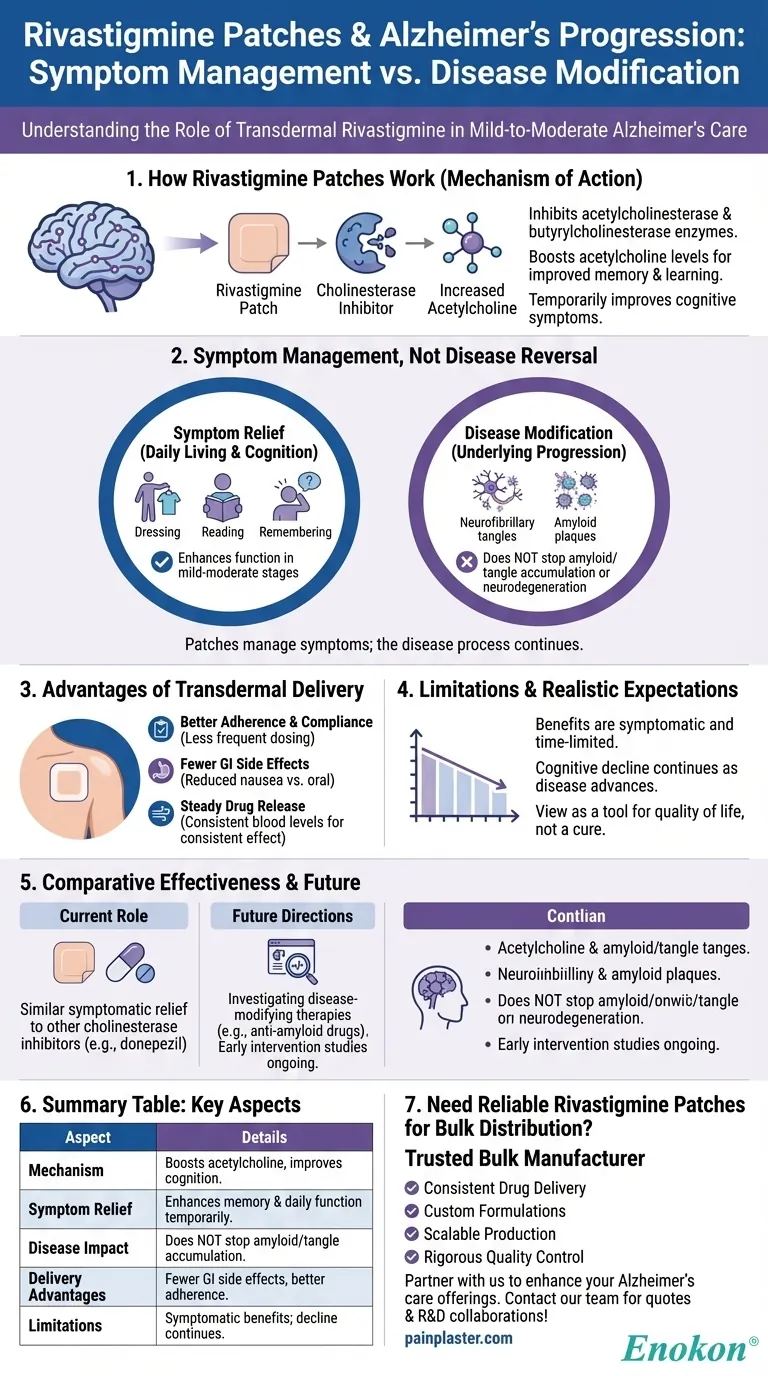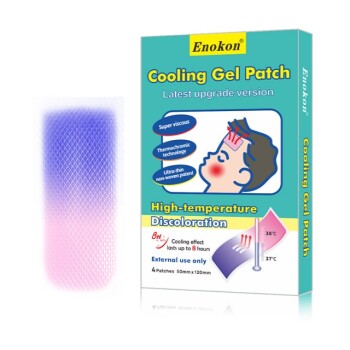Rivastigmine patches, a transdermal delivery system for the cholinesterase inhibitor rivastigmine, are used to manage symptoms of mild to moderate Alzheimer's disease. While they can improve cognitive function and slow the decline of memory and thinking abilities, they do not reverse or halt the underlying progression of Alzheimer's. The patches offer advantages like better compliance and tolerability but are not a cure for the disease.

Key Points Explained:
-
Mechanism of Action
- Rivastigmine works by inhibiting acetylcholinesterase and butyrylcholinesterase, enzymes that break down acetylcholine, a neurotransmitter critical for memory and learning.
- By increasing acetylcholine levels, the (Rivastigmine Patch)[/topic/rivastigmine-patch] can temporarily improve cognitive symptoms but does not address the neurodegenerative processes driving Alzheimer's.
-
Symptom Management vs. Disease Modification
- Clinical studies show rivastigmine patches can enhance cognitive function and daily living activities in mild to moderate Alzheimer's patients.
- However, they do not stop or reverse the accumulation of amyloid plaques or neurofibrillary tangles, the hallmarks of Alzheimer's progression.
-
Advantages of Transdermal Delivery
- The patch formulation improves medication adherence and reduces gastrointestinal side effects (e.g., nausea) compared to oral rivastigmine.
- Steady drug release maintains consistent blood levels, potentially optimizing therapeutic effects.
-
Limitations and Realistic Expectations
- Benefits are symptomatic and time-limited; cognitive decline continues as the disease advances.
- Patients and caregivers should view the patch as a tool to improve quality of life, not a cure.
-
Comparative Effectiveness
- Similar to other cholinesterase inhibitors (e.g., donepezil), rivastigmine patches offer modest symptomatic relief but lack disease-modifying properties.
- Research emphasizes combining pharmacological and non-pharmacological approaches for comprehensive care.
-
Future Directions
- Ongoing studies explore whether early intervention with rivastigmine could delay progression, but current evidence does not support this.
- Disease-modifying therapies (e.g., anti-amyloid drugs) are under investigation to target Alzheimer's root causes.
While rivastigmine patches are a valuable option for symptom management, their role remains distinct from treatments aiming to alter the disease course. For purchasers, understanding this distinction ensures informed decisions about therapeutic goals and patient expectations.
Summary Table:
| Aspect | Details |
|---|---|
| Mechanism | Inhibits acetylcholinesterase to boost acetylcholine, improving cognition. |
| Symptom Relief | Enhances memory and daily function temporarily in mild-moderate Alzheimer's. |
| Disease Impact | Does not stop amyloid/tangle accumulation or neurodegeneration. |
| Delivery Advantages | Fewer GI side effects, better adherence vs. oral rivastigmine. |
| Limitations | Benefits are symptomatic; cognitive decline continues over time. |
Need reliable Rivastigmine patches for your patients or distribution network?
As a trusted bulk manufacturer of transdermal patches, Enokon specializes in high-quality Rivastigmine patches tailored for healthcare brands and pharmaceutical distributors. Our expertise ensures:
- Consistent drug delivery for optimal therapeutic effects
- Custom formulations to meet specific patient or market needs
- Scalable production with rigorous quality control
Partner with us to enhance your Alzheimer’s care offerings. Contact our team today for quotes or R&D collaborations!
Visual Guide

Related Products
- Herbal Eye Protection Patch Eye Patch
- Far Infrared Deep Heat Relief Patches Medicated Pain Relief Patches
- Asthma Cough and Pain Relief Patch for Adults and Kids
- Menthol Gel Pain Relief Patch
- Icy Hot Menthol Medicine Pain Relief Patch
People Also Ask
- How quickly can you see results from using under eye patches? Instant Brightening & Long-Term Benefits
- How can using eye patches contribute to a self-care skincare routine? Boost Hydration & Relaxation
- When should a doctor be consulted regarding the use of this patch? Key Safety Guidelines
- Can under eye patches smooth fine lines and wrinkles? Hydrate & Plump for Youthful Skin
- What factors should be considered when purchasing eye patches? Essential Guide for Safe & Effective Use















